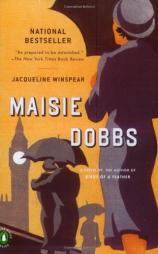Reading Group Guide
Discussion Questions
Maisie Dobbs: A Novel

1. How does Maisie's brief exchange with the newspaper vendor at the beginning of the novel (pp. 3-4) help to establish her character? Why is her combination of "bearing" and her "familiar way" of speaking such a surprise to Jack? How does this combination of qualities fit in with Maisie's desire for an office that is "something in the middle, something for everyone, something central, but then again not in the thick of things"?
2. Maisie initially has a hard time deciding what trade description to put on her nameplate (p. 5). At the end of the novel, she has firmly decided upon "M. Dobbs, Psychologist and Investigator." In what other ways, during the course of the story, does Maisie arrive at a clearer idea of who she is?
3. Enid, Maisie's roommate at Lord Compton's mansion, is vividly contrasted with Maisie. What implicit comparisons are made between the two young women? Despite her lack of formal education, does Enid possess a kind of wisdom that Maisie is slower to acquire? Does Enid's juxtaposition with Maisie help us to understand Maisie better?
4. When he learns that his wife is still mourning the early death of a former love who was horribly wounded in World War I, Christopher Davenham responds, "[O]ne just has to get on with it. After all, you can't just give in, can you?" (p. 52). Similarly, Mrs. Crawford criticizes James for being different from other ex-soldiers who have "got on with it" (p. 207). You may have noticed that the phrase "Get on with it" becomes an important motif late in the novel (cf. pp. 283 and 292). If getting on with it is such sensible advice, why is it so hard to follow?
5. Throughout most of the novel, the facial disfigurement of the veterans who join the colony at the Retreat generates sympathy for them. However, at a climactic moment in the story, their wounds are used to make them appear monstrous and inhuman: "With their damaged faces, once so very dear to a mother, father, or sweetheart, they were now reduced to gargoyles by a war that, for them, had never ended" (p. 262). In the story, and elsewhere, for that matter, can sympathy and repulsion exist comfortably side by side, or must one eventually triumph?
6. How does the young Maisie of the flashback chapters differ from the mature Maisie?
7. What obstacles does Maisie have to surmount, both personally and professionally, because she is a woman? How does her feminine identity influence her professional demeanor and investigative style? How do the obstacles of gender in the novel contrast with the obstacles of class?
8. Maisie finds herself situated between two powerful father figures: Frankie, her natural father; and Maurice, her intellectual "father." Both of these men represent different parts of Maisie's life and character though they have very little in common. How successful is Maisie in balancing their influences?
9. Despite the sinister nature of the Retreat, Billy Beale initially finds the compound somewhat attractive and feels respect for Adam Jenkins. Why?
10. Is Maisie as skilled at resolving her own inner conflicts as she is at dealing with those of others? Are there any relationships in particular that you think she mismanages? Why?
11. Imagine Maisie Dobbs as the basis for a screenplay. Choose a scene and discuss how you, as the director, would want to film it.
12. What is your response to the ending of the novel, particularly the last meeting between Simon and Maisie? Is Maisie more focused on her suffering or Simon's? Is her focus where it ought to be? Does the scene resolve the tensions of the story or heighten them?
Maisie Dobbs: A Novel
- Publication Date: May 25, 2004
- Paperback: 294 pages
- Publisher: Penguin Books
- ISBN-10: 0142004332
- ISBN-13: 9780142004333








